

Inside Google's Plan to Disrupt the College Degree (Exclusive) This morning, Google is announcing the next steps in its plan to disrupt the world of education, including the launch of new certificate programs that are designed to help people bridge any skills gap and get qualifications in high-paying, high-growth job fields--with one noteworthy feature: No college degree necessary.

The new tools could be a game changer for a growing number of people who consider the current educational system broken, or for the millions of Americans who are currently unemployed, much due to fallout from the Covid-19 pandemic. "The pandemic has led to a truly horrible year," Alphabet and Google CEO Sundar Pichai tells Inc. in an interview. "But it has also created profound shifts along the journey to digital transformation in ways no one could have imagined. " Most enrollees will finish in six months or less, putting the cost at about $240 for U.S. students. HuffPost is now a part of Verizon Media. HuffPost is part of Verizon Media.

We and our partners will store and/or access information on your device through the use of cookies and similar technologies, to display personalised ads and content, for ad and content measurement, audience insights and product development. Your personal data that may be used Information about your device and internet connection, including your IP address Browsing and search activity while using Verizon Media websites and apps Precise location Find out more about how we use your information in our Privacy Policy and Cookie Policy. To enable Verizon Media and our partners to process your personal data select 'I agree', or select 'Manage settings' for more information and to manage your choices.
The Perfect Storm: Universities, Governance, And The Politics Of Polarization. Colleges and universities in the United States are governed through a shared set of responsibilities and oversight for matters referred to as shared governance.
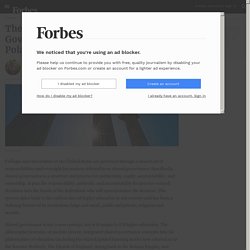
Specifically, shared governance is a structure and process for partnership, equity, accountability, and ownership. It puts the responsibility, authority, and accountability for practice-related decisions into the hands of the individuals who will operationalize the decision. This system dates back to the earliest days of higher education in our country and has been a defining feature of its institutions large and small, public and private, religious and secular.
Google Introduces 6-Month Career Certificates, Threatening to Disrupt Higher Education with "the Equivalent of a Four-Year Degree" I used to make a point of asking every college-applying teenager I encountered why they wanted to go to college in the first place.
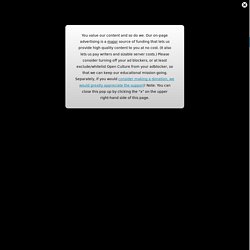
Few had a ready answer; most, after a deer-in-the-headlights moment, said they wanted to be able to get a job — and in a tone implying it was too obvious to require articulation. But if one's goal is simply employment, doesn't it seem a bit excessive to move across the state, country, or world, spend four years taking tests and writing papers on a grab-bag of subjects, and spend (or borrow) a large and ever-inflating amount of money to do so? This, in any case, is one idea behind Google's Career Certificates, all of which can be completed from home in about six months. Any such remote educational process looks more viable than ever at the moment due to the ongoing coronavirus pandemic, a condition that also has today's college-applying teenagers wondering whether they'll ever see a campus at all. Related Content: Free Online Computer Science Courses. Google Has a Plan to Disrupt the College Degree.
Google recently made a huge announcement that could change the future of work and higher education: It's launching a selection of professional courses that teach candidates how to perform in-demand jobs.
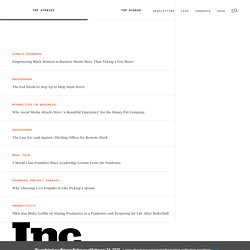
These courses, which the company is calling Google Career Certificates, teach foundational skills that can help job-seekers immediately find employment. However, instead of taking years to finish like a traditional university degree, these courses are designed to be completed in about six months. "College degrees are out of reach for many Americans, and you shouldn't need a college diploma to have economic security," writes Kent Walker, senior vice president of global affairs at Google. "We need new, accessible job-training solutions--from enhanced vocational programs to online education--to help America recover and rebuild. " HuffPost is now a part of Verizon Media. If there’s one thing you can count on in these uncertain times, it’s that the cost of college will rise—and then rise some more.
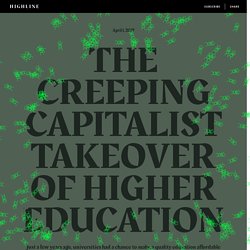
Almost every year, whether the economy is in a state of boom or bust, tuition hits a record high. But why? Is it really twice as expensive to provide a degree as it was 20 years ago? Declaring Independence In College Admission. What does it mean to be free?
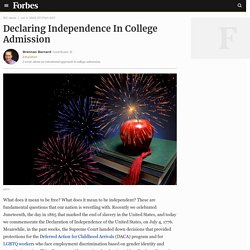
What does it mean to be independent? These are fundamental questions that our nation is wrestling with. Recently we celebrated Juneteenth, the day in 1865 that marked the end of slavery in the United States, and today we commemorate the Declaration of Independence of the United States, on July 4, 1776. Meanwhile, in the past weeks, the Supreme Court handed down decisions that provided protections for the Deferred Action for Childhood Arrivals (DACA) program and for LGBTQ workers who face employment discrimination based on gender identity and sexual orientation. This all comes amidst a national reckoning with police brutality and systematic racism, as supporters of the Black Lives Matter movement and others say “enough!”
UC Berkeley administrators talk COVID-19's impact on future of education. While disruptive, the pandemic and the subsequent move to online education have changed the future of higher education, according to UC Berkeley administration.
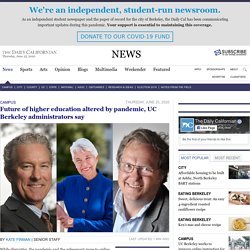
The discussion about the future of higher education occurred during a webcast from the Commonwealth Club of California, a nonpartisan nonprofit that hosts education-related talks and events. UC Berkeley Chancellor Carol Christ, Dean of Undergraduate Studies Bob Jacobsen and Chief Innovation and Entrepreneurship Officer Rich Lyons participated in the event, sharing their experiences adapting to the constraints of the COVID-19 pandemic and what they hope for the future. According to Christ, one of the lessons the pandemic has taught both students and the school’s institution is resilience, which she said she thinks is a valuable life skill. “The healthiness of the community has to come from the people pulling together and reacting,” Jacobsen said at the event. “They are trying to find positive ways forward. Government's university fee changes mean humanities students will pay the entire cost of their degrees - ABC News. It’s Time To Take Time Out Of Learning And Reinvent Higher Education.
Everything takes more time if you are poor.
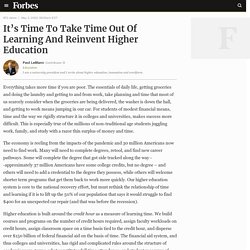
The essentials of daily life, getting groceries and doing the laundry and getting to and from work, take planning and time that most of us scarcely consider when the groceries are being delivered, the washer is down the hall, and getting to work means jumping in our car. For students of modest financial means, time and the way we rigidly structure it in colleges and universities, makes success more difficult. This is especially true of the millions of non-traditional age students juggling work, family, and study with a razor thin surplus of money and time.
The economy is reeling from the impacts of the pandemic and 30 million Americans now need to find work. Many will need to complete degrees, retool, and find new career pathways. Higher education is built around the credit hour as a measure of learning time. The London Interdisciplinary School takes a new real-world approach. From our Obsession We’ve never been as connected, or as isolated.
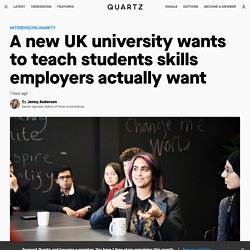
Getting a university degree has never seemed more important: college graduates earn more money, live longer, and are happier. But college degrees are expensive (especially in the US), narrowly focused (especially in the UK), and often fail to build the skills employers want (true in most countries). A new university in the UK wants to change that. How The University Of The Future Must Adapt To Train Future Leaders. Moodle. Futures of Education - LEARNING TO BECOME. China has started a grand experiment in AI education. It could reshape how the world learns. Zhou Yi was terrible at math. He risked never getting into college. Then a company called Squirrel AI came to his middle school in Hangzhou, China, promising personalized tutoring.
Coding Academies And The Future Of Higher Education. I recently had an extraordinarily interesting conversation with Darrell Silver, the cofounder and CEO of Thinkful, a coding academy that currently has about 1,600 students. It is doing lots of innovative things, explaining why much of traditional higher education is struggling.
It and other coding academies provide hope that our nation's future human capital needs can be fulfilled more efficiently and effectively than currently. The coding academy model reeks with incentives and innovation, keys to educational reform. Thinkful is an online institution, so it avoids enormous capital costs (expensive buildings empty for much of the year); it uses as its faculty part-time professionals who do this in addition to a regular job; it offers students a zero tuition option using an Income Share Agreement model that motivates both student and Thinkful to perform well. It is for-profit, adding incentives to deliver students services cheaply while providing them very marketable skills.
Higher Education's Push Toward Lifelong Learning. When the giant Indian technology-services firm Infosys announced last November that it would open a design and innovation hub in Providence, the company’s president said one of the key reasons he chose Rhode Island was its strong network of higher-education institutions: Brown University, the Rhode Island School of Design, and the Community College of Rhode Island. In a higher-education system that is often divided between two- and four-year colleges and further segregated between elite and nonelite institutions, it’s not often that a community college is mentioned in the same breath as an Ivy League campus. Nor is a two-year college seen as a training ground for jobs in the so-called creative economy, which include industries such as design, fashion, and computer gaming that typically require bachelor’s degrees.
Unreal+Engine_Why-Real-Time-Technology-is-the-Future-of-Film-and-Television-Production-ecc14547ab8a340d4c00e2f931adfcf3a201478d. Digital in 2018. The Art of Storytelling in an Era of Connected Audiences. Once upon a time, brands and agencies set out to tell the most engaging, transparent and shareable stories the world had ever seen. Little did they know, the audience would become storytellers in their own right. That signal, that certain spark to break the fourth wall to connect with audiences had since extinguished. The world moved on. Streaming: is the future Filmstruck? Has Marketing Changed Filmmaking? Digital literacy 1: What digital literacies? 2018 Is the Year of the Intangibles – BRIGHT Magazine.
As Flow of Foreign Students Wanes, U.S. Universities Feel the Sting. How You’ll Look For A Job In 2018. Plenty of New Year’s resolutions include searching for a new job. And people don’t just add it to their lists because they hate their current job. Overall, ZipRecruiter found that nearly half (49%) of Americans who are actively looking for a new job said they love, or at least like, their current job. But 68% of employed job seekers believe that the types of jobs available today are better than what was available before. For those looking at greener pastures, there’s good news. The ManpowerGroup Employment Outlook Survey found that 21% of the over 11,000 employers across all industries in the U.S. they surveyed are planning to hire in the coming quarter. The challenges facing universities in 2018. Image copyright Getty Images.
College Closings Signal Start of a Crisis in Higher Education. A Harvard Professor Says Half of All Colleges Won't Exist in 10 Years (and Why a New Model Might Provide a Better Path to Career Success) If you've ever used the word "disruption" to refer to innovations that create new markets and displace long-established companies and products, you might have Harvard Business School professor Clayton Christensen and his bestselling book, The Innovator's Dilemma, to thank.
Elizabeth Rata: NZ's knowledge blind spot. FEBRUARY 19, 2019 Updated 13 hours ago. What Is the Purpose and Future of Higher Education? A recent story asked, “Can small liberal arts colleges survive the next decade?” This question is important as we see the closure of some small schools, mostly in areas away from big cities. Yet, as University of California Riverside sociology and public policy distinguished professor Steven G. Alan Watts: Why education (as we know it) is a hoax. Alan Watts was an instrumental figure in the 1960s counterculture revolution.He believed that we put too much of a focus on intangible goals for our educational and professional careers.Watts believed that the whole educational enterprise is a farce compared to how we should be truly living our lives.
2018 NMC Horizon Report. Overview. The World’s Changing Fast. Here’s How Higher Ed Can Keep Up. Higher Education's Push Toward Lifelong Learning.